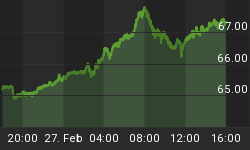The Chinese stock market's spectacular run is turning into a stagger:
Two more Hong Kong stocks collapse after Hanergy crash
(AFP) -- Two of Hong Kong's best-performing stocks plunged more than 40 percent Thursday, a day after a mysterious crash of almost 50 percent in Chinese solar firm Hanergy that saw almost $20 billion wiped off its market value.
Goldin Financial sank 43.34 percent to HK$17.48 and Goldin Properties crashed 40.91 percent to HK$14.36, after soaring more than 300 percent since the start of January, according to Bloomberg News.
The drop slashed the firms' combined market value by more than $20 billion.
The companies, which have interests ranging from property development in Hong Kong and China to vineyards in California and France are owned by Chinese tycoon Pan Sutong.
The dramatic sell-off came after a 47 percent dive in Beijing-based solar energy firm Hanergy Thin Film Power (HTF).
Trading in the firm was suspended after 24 minutes, but not before $19 billion was struck off the firm's value. The company said it would make an announcement containing "insider information" in the wake of the suspension, although it has not yet done so. HTF had surged more than sixfold in the past year, making it the world's largest solar power company by market value, but prompting questions over its valuation and revenue sources.
Even by tech standards, those are big, fast moves. And the bull market in which they occurred is also pretty epic. From London's Telegraph:
China's stock market bubble shows no sign of bursting yet
Last week I wrote that the market in German Bunds had become a bit too exciting for some investors. By the orderly standards of fixed income investing, the ups and downs of bond prices may have been a bit frisky. But they pale into insignificance compared to what's going on in Shanghai and Shenzhen. China is becoming the Wild West of investment.
Since the start of the year, the Shanghai index has risen by 37pc and its sister exchange in Shenzhen is up by 53pc. Over the past year the two markets have risen by 122pc and 96pc respectively. That's punchy enough, but it fails to tell the whole story. Many individual shares have done much more. Beijing Baofeng Technology, a video company, rose by 44pc on its first day on the Shenzhen market in March and then by the 10pc daily limit each day every day for a month. It is currently worth more than 40 times its IPO price. The flotation was nearly 300 times oversubscribed.
Consider, too, that around half the stocks listed in Shenzhen are valued at more than 50 times their expected earnings and nearly a fifth at more than 100 times. Margin trading, where investors buy shares with borrowed money, has more than quadrupled since last summer to be worth nearly £200bn. At 8pc of total trading volumes, these risky trades have reached a level that not even previous manias in Taiwan and Japan approached. The average valuation multiple on Shenzhen's index for start-ups, ChiNext, is over 100 despite (or because of) the fact that one in five of the companies listed there is not even covered by any investment analysts.
There's more. The volume of trading on China's major exchanges has reached nearly £140bn on several days this year. That's around four times the value of daily deals on the New York Stock Exchange. In one week recently, a record 3.3m new trading accounts were opened. There are now more than 200m accounts being used by an estimated 100m investors. Worryingly, half of these new investors received no education beyond high school against a quarter of existing account holders. The shoe-shine boys are tipping stocks again.
Why this bubble now? Because of the usual mix of catalysts: Aggressive government borrowing abetted by a central bank that most people expect will shortly join the global currency war, and, as the Telegraph article notes, deregulation that has allowed millions of new players (most with a limited understanding of how share prices normally relate to underlying earnings) to belly up to the buffet.
What happens next is also pretty standard, and it generally begins with a few notable high fliers that never should have been reverting to their true value. We won't know if these are them until after the fact, but today's numbers do make the inevitable look imminent.















